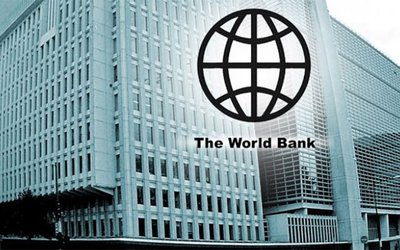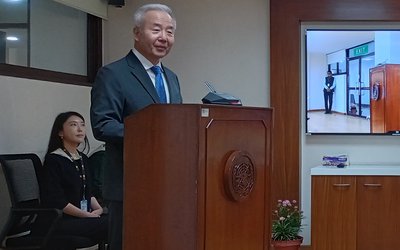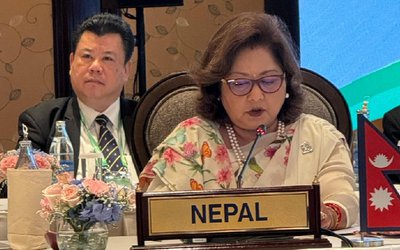
It is, indeed, a privilege for the Government of Nepal to host the 8th International Conference on Community Based Adaptation in Kathmandu.
Climate change has emerged as the defining issue of our time. There has been the irreversible degradation of ecosystem affecting our life-support system. Global warming and climate change are said to be posing existential threats to human survival. Several reports and studies warn that 'warming of the climate system is unequivocal' and the impacts of climate change on natural and human systems is all pervasive. It is sad to note that the vulnerable sections of our society particularly the poor and marginalized communities are made to bear the brunt of climate change for no faults of theirs.
Nepal is in important location in terms of the balance of regional ecosystem of South Asia. And, we are not immune from the changes in our climate system. We have experienced climate-induced extreme events like rapid melting of glaciers, shifting weather patterns, high floods, extended droughts, loss of biodiversity and depletion of water sources. These changes have been exerting immense pressure on the lives and livelihoods of the poor and the climate vulnerable people.
Least Developed Countries (LDCs), including Nepal, which have contributed least to greenhouse gas emission and are least capable of adaptation, are the worst victims of climate change. Adverse and disproportionate effects of climate change have severely undermined our development endeavors, reversing the development gains achieved over the years and pushing already poor people to the brink of extreme poverty. I am aware that many countries around the world are facing similar problems, and no country remains immune from the effect of climate change. Global problems require global solutions calling for a concerted and unified effort of all stakeholders at all levels-local, national, regional and global. This should respect the fundamentals of 'common but differentiated responsibilities,' for sustainable development outcomes as we commit ourselves to the task of creating an order of constructive, creative, and secure future for future generation.
We, in Nepal, are passing through the process of democratic transition. At present, we are engaged in laying the foundation of political pluralism based on the universal values of democracy, human rights and fundamental freedoms, good governance and the rule of law. The primary national task before us is to have a democratic constitution promulgated through the Constituent Assembly as per the wish of the people of Nepal as expressed in the November 2013 elections. This will lay the foundation of constitutionalism in the country, and bring the ongoing peace process to its logical conclusion and herald a new era of peace, stability, democracy and prosperity in Nepal.
Climate change has received top priority in Nepal. The fact that the Climate Change Council has been established under the chair of the Prime Minister is a clear testimony to our strong political commitment to climate change. We have put in place necessary legislative and policy framework to deal with climate change and related activities. We are implementing climate change policy and are focusing on strengthening our institutions and coordination mechanism.
Efforts are underway in implementing the most urgent and immediate climate adaptation actions through a framework on Local Adaptation Plans for Action (LAPA) and a separate climate change budget code for tracking public expenditure. We are also in the process of developing a low carbon economic development strategy. I believe our efforts will provide direction for future course of actions towards helping the poor and climate vulnerable communities adapt to the adverse impacts of climate change.
Generating awareness in local communities, especially the most vulnerable among them, of the adverse impact of climate change and enhancing their capacity to adapt to climate change and improve their livelihoods should constitute the core of community based adaptation efforts. Where available, community-developed best practices can be scaled up and shared widely including through integration of such practices into national development plans and policies.
Nepal has been leading the LDC Group at the UN climate change negotiations. We are thankful to all LDCs for their continuous support in articulating and defending the collective voice of the group. We also thank all those countries that have contributed to LDC Fund, Adaptation Fund and Green Climate Fund to support LDCs in their efforts on developing adaptive capacity and building resilience to climate change impacts. However, what is available is not enough. Moreover, climate financing should not compromise financing regular development activities. It should be additional. The international community particularly the rich countries should assume global responsibilities and fulfill their commitments. We also call for a balanced approach between adaptation and mitigation. Resources going to adaptation should be enhanced to help prevent climate related disasters in poor countries. Their support in implementing local adaptation plans and promoting low carbon economic development path in the LDCs and other developing countries is critical. We are of the view that the process to accessing the Fund by the Parties needs to be simplified and streamlined, and LDCs must be supported to build their capacity in confronting the challenges.
We call for greater international cooperation and commitment for reducing greenhouse gas emissions and increasing local communities' adaptive capacity. The flow of an additional, predictable and sustained funding as well as transfer of appropriate and reliable technologies is vital for this.
As we discuss the progress in the implementation of Millennium Development Goals (MDGs), subscribe ourselves to Sustainable Development Goals (SDGs) set out by Rio plus 20 and forge an acceptable post 2015 Development Framework, we call for a better and productive partnership between developed and developing countries. The role of resources is critical in realizing our goals. This meeting is discussing ways to secure climate finance for the poor and climate vulnerable communities to adapt to the adverse impacts of climate change. It is also important because its outputs could feed into the Climate Summit scheduled for September 2014 in New York, which is hoped to generate the necessary political will to achieve an ambitious, fair and effective climate agreement in 2015. The international community, especially the major players, must exhibit requisite political will in this regard. Further delay in reaching a concrete global deal on this crucial issue will be detrimental to humankind as a whole beyond comprehension.
Let me conclude with a quote from Mahatma Gandhi. He said, and I quote, 'Earth provides enough to satisfy every man's need, but not every man's greed.' End of quote. Let us sacrifice our personal greed in favor of larger needs of posterity.
Koirala is the prime minister of Nepal. Excerpts of the statement delivered at the confernce.
- Peace, democracy and sustainable development are inextricably linked and mutually reinforcing: Prime Minister Sushil Koirala
- Sep 26, 2014
- Irreversible March To Democratic Pluralism
- May 24, 2014
- India and China remains focus of Nepal
- May 08, 2014
- BIMSTEC for regional prosperity
- Mar 05, 2014
- ‘Our primary focus is on neighbouring countries’
- Feb 15, 2014















